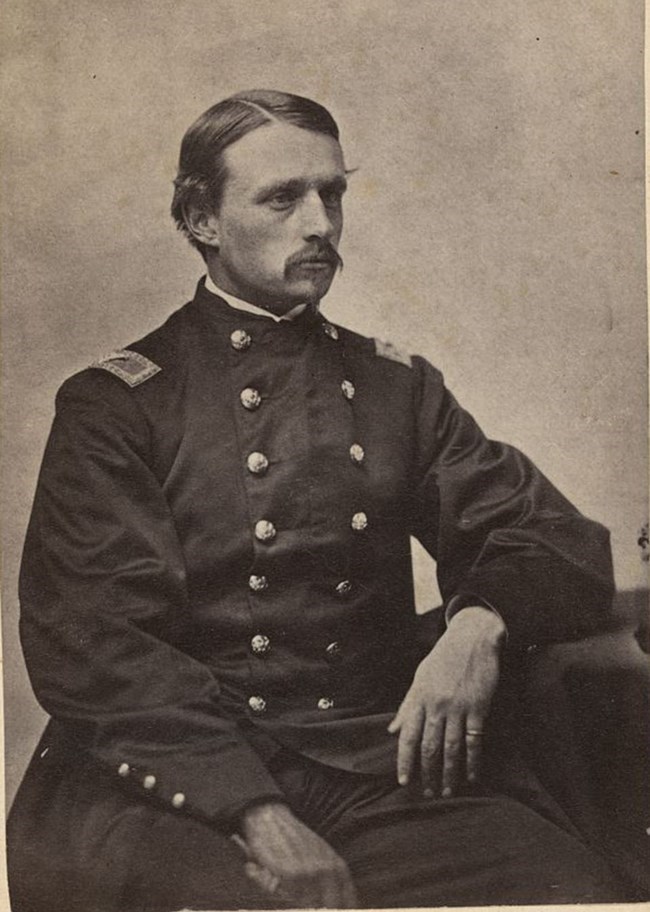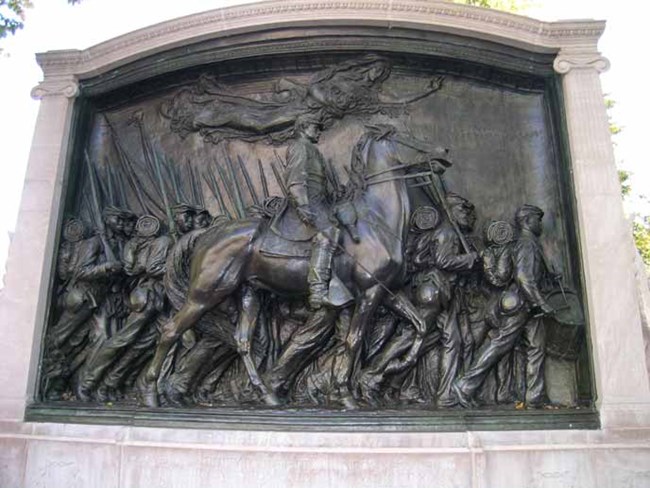The truth about the world is that there is no semblance of destiny or really a right side of history. Often heroes do not get to ride off into the sunset, do not get to see the full impact of their actions, and do not even see the success they want in their lifetime. However, it is their hard work, passion, and the actions they take in their life that can make all the difference for the future they do not see. This is especially true for Union Colonel Robert Gould Shaw, leader of the African American 54th Massachusetts Volunteer Infantry Regiment.
Shaw was the son of a wealthy abolitionist family in Massachusetts. Notably, his family were friends of the prominent authors of the time period such as Nathanial Hawthorne and Ralph Waldo Emmerson who were also abolitionists. Needless to say, opposition to slavery and support for the rights of man was something he had exposure to growing up.
After Shaw’s family moved to Staten Island, his uncle Joseph Coolidge Shaw, a convert to Catholicism and priest, convinced his parents to send him to the Second Division of St. John’s College. After the death of his uncle, he struggled to adapt to the college and instead went to Germany for college before returning to the US and attending Harvard. Inevitably, he failed to obtain a degree as he hated his time there and spent most of his college time either getting involved in social events or dedicating himself to his personal beliefs and interests such as reading Uncle Tom’s Cabin repeatedly. He later got a job with another uncle, which he also hated.
Once the civil war started, he volunteered, serving initially for a New York regiment before serving for Massachusetts. He served as a line and then staff officer during the Battle of Antietam and was wounded twice during his service. Finally, he had found his calling as he continued to rise up in the ranks.
In 1863, Governor John A. Andrew of Massachusetts, with the allowance of President Abraham Lincoln’s Emancipation Proclamation, announced the intent of creating an African Regiment. This was harder than expected as Massachusetts did not have a large enough free African American population so they had to import supporters from as far as Canada. However, as there was skepticism towards allowing such a regiment, Shaw was selected to oversee it, train it, and prepare those troops for battle.
Despite skepticism that such a regiment could reach the same military preparation as white regiments, Shaw was quickly able to prove that the soldiers were ready for military preparation. Unfortunately, the regiment was still not allowed to get involved with actual combat as it was instead used for manual labor. To make matters worse, it was involved in burning a town to the ground during a siege as commanded by Shaw’s superiors. None of this was fair to the men of the unit as the regiment was used more for dirty work than actual combat.
Nevertheless, Shaw found this abhorrent and persisted to make the unit accepted for combat. Eventually, his constant lobbying found a way to win supporters and he was able to convince his superiors to allow the 54th to lead the charge on James Island against Fort Wagner. The fort was highly fortified and taking it seemed so unlikely that the colonel confided in a friend that he thought there was a high possibility that he would not be coming home.
The 54th led the charge and managed to push forward under heavy fire from confederate forces. Eventually, they scaled the walls of the fort and continued to fight, getting so close that union and confederate forces engaged in hand to hand combat. Shaw himself was shot cheering his men onwards and fell into the fort, dead.
Despite falling, the brave and loyal men of the 54th continued fighting onwards until they no longer could. They paved the way for even more union regiments to continue forward, but the fort was never taken. In the end, the 54th faced 42% casualties and Shaw himself was among them.
Before continuing, it is important to remember that the amount of pressure on the all African American regiment was incredibly high. Not only did it need to prove it could do the job of a regiment on par with white units, it had to prove that there was a place for African Americans in the Union Army and on the battlefield. Despite the failure at Fort Wagner and Shaw’s own death, they succeeded.
Following the battle, enlistment among free African Americans increased significantly in the North. Enlistment was so high that they made up 10% of the union army and received equal pay with their white counterparts. Sgt. William H. Carney, who saved the flag of the 54th at the battle, was later the first African American to be awarded the Congressional Medal of Honor. The courage and valor of the men of the 54th was important for the cause of letting African Americans in the army and without them or the tireless work of Shaw to get them in the fight, we never have gotten that or the eventual integration of the armed forces almost 100 years later.
As for Shaw, he was buried with the men of the 54th. The confederates who did so thought it was an insult to be buried with African Americans, but his parents said he would have considered it an honor. The young man who was never able to find where belonged did finally find his place, and it was alongside the men he led to end slavery, both in life and death.
The story of Colonel Shaw, the young idealist that never belonged who became a proud patriot that worked tirelessly for equality, is one of sacrifice and the betterment of mankind. Though he never got to see the fruits of his labor and those who served under him. Yet the world is better for his work and the country owes him a great debt. May the United States honor him as a great hero like many others.



One of my favorite American heroes!
ReplyDelete